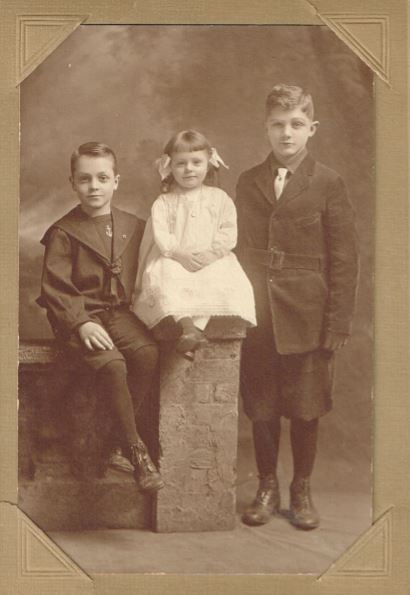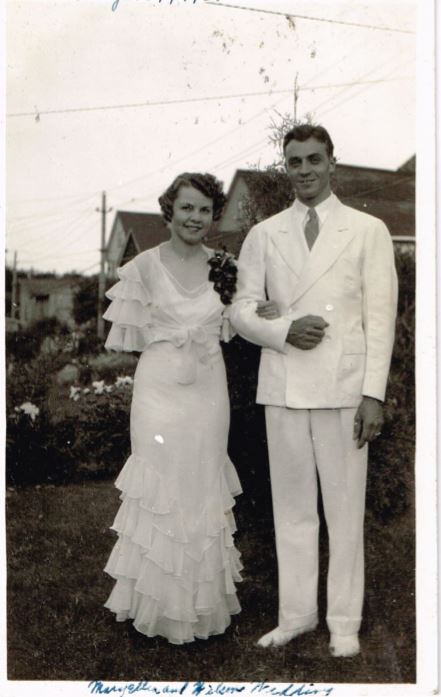BOSTON — This April 20, centenarian Floyd Crellin, a long-term resident at the Sherrill House nursing home, turned 104 years old.
“It’s a little worse than it is 103,” Crellin said with a laugh.
Crellin sat on the plaid couch facing the floor-length windows in a quiet, sunlit room at the Sherrill House next to his son, David Crellin—the place that they consider their “favorite spot.”

Floyd Crellin (left) and David Crellin (right) talking on the couch at the Sherrill House nursing home.

David (right) and Floyd (left) in their “favorite spot” at the Sherrill House nursing home in Jamaica Plain.
“Most people who are his age, their hands are shaky,” David explained, as Crellin extended his hands. “Not his.”
Last year, Crellin became a participant in the New England Centenarian Study at the Boston University School of Medicine, one of the many research centers seeking to discover the secret to a long, healthy life.
The Centenarian Study has recently made its participant inclusion criteria a lot more strict due to the growing number of people reaching their late nineties. At 104, Crellin surpasses the minimum age qualification for enrollment.

Floyd and his siblings. Floyd (left), Dorothy (center), and Charles (right). Photo provided by the Crellin family.
“Back when we started in 1995, we enrolled men who were 95 and older, and women who were about 98 and older,” said Dr. Thomas T. Perls, the director and founder of the study. “And now, we really want everybody to be 103 and over … We’re interested in these very rare ages that are quite difficult to get to.”
The number of people who live to at least 100 has increased by almost 66 percent in the past 30 years, while the total population has increased by about 36 percent, according to the latest US Census Bureau report.
Despite the rising number of centenarians, the Bureau’s data indicates that they still only make up about 0.02 percent of the U.S. population.
Even in 2015, living to 104 still remains a rare feat. Crellin has outlived his peers, spouses and both of his siblings.
“There’s nobody in our department that I can compare to because there’s nobody that old,” Crellin said. “I don’t do anything to become old.”
Aging and longevity researchers in the U.S. and around the world are attempting to answer the question, why do some people live longer than others?
According to Crellin, he did not do anything unique or special throughout his life to live as long as he has.
“I don’t know what it was,” Crellin said. “All you can say is that I didn’t go the other way, you know. I didn’t drink a lot, and smoke, and all that stuff—things that would make you old.”
Timeline of Floyd Crellin’s early life
Crellin began ballroom dancing at a young age, and later taught dancing for 15 years. Throughout his adulthood, Crellin and his late wife, who was also a ballroom dancer, took dance lessons together in waltz, foxtrot and tango, and competed in local dance competitions.
Crellin continued to dance at 100 years old, and exercised frequently into his 90s.
“My father joined an off-road bicycle club when he was 94,” David said. “He had an 18-speed trail bike, and every week he would throw his bike on the back of his car, meet up with his friends, and they would go riding about 20 miles.”
Crellin entered an assisted living home after he broke his hip in a fall, and stayed there for five years. He was then forced to transfer into the long-term care facility at the Sherrill House due to a subsequent fall, and has resided in the nursing home for the past two years.
Although Crellin is now dependent on a wheelchair and the assistance of others, he received special permission to use the physical therapy gym in the Sherrill House with the help of David, and they now enjoy exercising together during David’s visits.
“Even now we go and use these machines downstairs,” Crellin said. “And I keep up with him. Or he keeps up with me, I don’t know.”
Current research suggests that a person’s ability to live to his mid- to late-80s is about 25 percent determined by genes, and about 75 percent contingent on maintaining a healthy and active lifestyle like Crellin’s.
However, Perls at the BU Centenarian Study suspects that this does not hold true for those on the path to achieving extreme old age.
“To get to, say, 107 or older, I think it becomes the opposite situation where getting to such an age really requires a strong genetic advantage to the point that 75 percent of it is genetic, and 25 percent of it is your behaviors,” Perls said.
In the past it was thought that genetics did not play a major role in giving certain people an advantage to reaching over 100 years old. However, in recent years, the Centenarian Study has emphasized the study of genetic influence on longevity and how well a person ages.
As the longest running and largest centenarian study in the world, Perls believes BU’s research center is “at the forefront of the field” in demonstrating that the variation in how old people live to be is determined more by genes with increasing age.
At 104, Crellin remains relatively healthy for his age, aside from vision and hearing impairments.
“There’s nothing wrong with him,” David said, repeating what Crellin’s doctors concluded after examining his condition.
“It’s already rare to get to 104,” Perls said, referring to Crellin. “It’s about maybe 1 out of 70,000 people who are 104. For one of those to be a man is really, really rare.”
Although nine out of 10 centenarians are women, the men tend to be healthier than the women and are less likely to live with chronic diseases.
This may explain why Crellin does not suffer from age-related issues like strokes, heart attacks, diabetes, high blood pressure or Alzheimer’s disease.
“What we found, particularly for those getting to these oldest ages … they naturally actually compress the time that they’re sick toward the very end of their lives, and compress their morbidity to the very end of their very long lives,” Perls said. “So they markedly delay and some cases escape age-related diseases .”
The goal of the Centenarian Study’s research is not to get more people to live into their 100s, but to maximize people’s healthy aging.
Centenarians like Crellin provide researchers with both the hope and likelihood that further studies of these individuals will lead to an understanding of the genetic variations associated with exceptional longevity, and ultimately the discovery of how to delay or prevent age-related diseases like Alzheimer’s.
Despite not being able to dance or ride a bike anymore, Crellin is able to converse and exercise with David, enjoy frequent visits from two of his grandsons who live in the Boston area, and celebrate birthdays with his family.
For Crellin, not much has changed in the past few years except that his longevity is now even more remarkable, especially as a male.
“I don’t see any difference,” Crellin said. “I haven’t seen any difference in the last 5, 10 years. I just go the hell on, just go on.”

